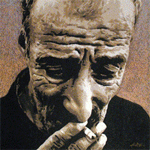
Nigeria, South Korea Battle
For Second Behind Argentina
By JEREMY BROWN
One Great Season
The Albiceleste, the Super Eagles, the Taeguk Warriors and the Pirate Ship. Messi and his 10 friends, a faded African powerhouse, Asia's likeliest lads and the one-hit wonder of 2004. Tossed together in a pot that looks sure to bust some brackets. Indeed, Argentina remain the favorites to lead the group, though no thanks to a tumultuous qualifying saga that culminated with a collection of world-class ballers grinding out an uuuuugly 1-0 win at the 11th hour against their old rivals from across the river.
Conventional wisdom has it that Nigeria and South Korea will slug it out for the second spot, with unfancied Greece bringing up the rear (watch it). However, most people said the same thing about the Mediterraneans six years ago in Portugal.
Argentina
The Argentine road to South Africa was littered with high-altitude massacres, biblical downpours, last-gasp winners, painful losses to Brazilian arch-rivals, coaching changes, musical armbands, defections of key personnel, the ineffectiveness of the planet's finest player and, of course, the unknowable whims of a bloated, bewhiskered, profane and diamond-encrusted national demigod in the form of Diego Maradona.
BIO: Meet Jeremy Brown
Since El 10 took over the head-coaching duties from Alfio Basile in November 2008, Maradona has fielded virtually every Argentine citizen able to walk upright, presumably stopping just short of kidnapping Manu Ginobli or disinterring Julio Cortazar to make up the numbers. The actual figure hovers somewhere above 100, which is a good deal more legs than other countries have tested, and has had the ostensible effect of preventing the squad from achieving any sort of cohesion during qualifiers.
Further, he's experimented with more lineup formations than your average fantasy football fanatic, toying with a 4-4-2, 4-3-3, 3-4-3, 4-2-3-1, 4-4-1-1 and 3-5-2, all while continually rotating players. And folks in Argentina are breathing down Lionel Messi's neck for not scoring for his country! Nevermind that the Albiceleste possess no one in the same stratosphere as Barcelona's Xavi, Andres Iniesta or Dani Alves to link up with, the poor kid probably didn't know half his teammates' first names, let alone how he was supposed to be playing off them.
It appears that the former Boca Juniors idol has actually settled on a 4-4-2 formation (or 4-4-1-1, depending upon how much Messi drops back into midfield). He's even taken the unusual step of announcing his starting lineup so far in advance (except for the striker who isn't Messi); and he's taken the extraordinarily unusual step of playing a flat stay-at-home back four of central defenders, depriving the team of overlapping, marauding full-backs, one of the great weapons of the modern game. Presumably much will asked of his wingers, Newcastle's workmanlike Jonas Gutierrez and coveted-by-every-team-in-the-world Angel di Maria, to provide width and defensive cover. Juan Sebastian Veron steps into the Riquelme role, while Javier Mascherano will protect the defense until he gets red carded in the second minute of the first match. Messi will play just behind his strike partner, who could be Carlos Tevez, Gonzalo Higuain, Diego Milito, Gabriel Batistuta, Evita, I don't know.
MORE: Meet The 2010 OGS World Cup Writers
But it's perhaps more telling to dwell on who's staying home this summer. Maradona, to put it diplomatically, is a complex and peculiar man, prone to lapses in judgment, evidenced in recent months by running over a reporter with his car, inducing his household pooch to rip 10 stitches worth of face from his head and earning a two-month suspension for hurling much unrepeatable invective in the direction of the press corps. Such ill-judgment runs the gamut from cretinous to criminal, though no recent decision is, perhaps, as unforgivable as omitting Esteban Cambiasso and Javier Zanetti from the final 23-man roster.
Two accomplished champions, heavily involved in Inter Milan's march to an unprecedented treble, miss the cut in favor of barely capped yeanlings and Fabricio Coloccini. I don't believe the Guardian overstated the point in calling the snubs a "Shakespearian fit of blindness." After being Pekermaned four years ago, Inter captain Zanetti, who excels in either fullback position or in midfield, will feel particularly aggrieved to miss the party again, while Cambiasso, who comprised one-half of Jose Mourinho's two-man defensive midfield screen that frustrated the likes of Chelsea, Barcelona and Bayern Munich (and probably spared Inter and Argentina defender Walter Samuel's blushes a few times), has never been on Maradona's radar. Kind of like your girlfriend's disapproving friend who just ain't gonna like ya no matter what ya do.
But that's old news by now, just like the fact that Juan Roman Riquelme won't be quarterbacking the offense as he refuses to play for Diego. What has gone largely overlooked, however, is the preclusion of several first-rate central midfielders. Apart from Cambiasso, Fernando Gago, Lucho Gonzalez and most distressingly, Ever Banega, will not be deputizing for Mascherapunzel; that job goes to Fiorentina's erratic and little-used Mario Bolatti. Valencia's Banega emerged from an 18-month doldrums to become arguably the best box-to-box midfielder in Spain, and that's no reference to his Internet dalliances. Likewise, Lucho, with close to a half century of caps under his belt, has matured into the cornerstone of a talented Marseille side that stormed to their first Ligue 1 title since 1992, and Gago, a bit-part performer in Real Madrid's unending carousel of squandered talent, has always performed admirably in the sky blue and white (we’ll pretend Bolivia never happened).
Argentina's strength lies in their world-class forward line—maybe the best assemblage of strikers to ever appear at a World Cup—consisting of Messi, perennial Ugliest Guy At The Tournament contender Tevez, Pipito Higuain, Milito (who reportedly was left off the roster until an assistant coach, almost certainly with the aid of magic, talked some sense into Maradona), Sergio "Nepotista" Aguero and Martin Palermo, back from a decade-long international exile for the heretofore unpardonable crime of missing three penalty kicks in one match. It's testament to this team's topheaviness that a player such as Lyon's Lisandro Lopez, who strolls into many international set ups, is forced to—gasp—spend time with his family this summer. As selection headaches go, this is a Sunday morning in Vegas, but Maradona can take solace in that whoever is paired with Messi is one of the planet's most inventive predators. Except for Aguero. He's possibly the most overrated player in all the land, save for Zlatan Ibrahimovic who fucking sucks. But I digress.
If Argentina can survive Maradona's tactical idiosyncrasies and Messi can at least partially duplicate his domestic form, and, well, a shitload of other ifs, then the squad can go far. The core is solid, though the bench from midfield back is a touch flaca. Look for a strong showing in the group stages. Then look for the wheels to begin falling off in the knockout round(s).
Nigeria
As any degenerate gambler worth his pleather fedora knows, predicting the outcomes of tournament play is tough stuff, particularly when the game you're betting on involves a team as scatterbrained as the Super Eagles. Which Nigeria will show up? The steady, defensively organized unit? The flashy, yet profligate lot? Or the one that barely scrapes by something called Equatorial Guinea? What will be the final score of the 2021 Super Bowl? Beats me. I'd rather spend the night at a bus station in Lagos than be forced to accurately predict what South Africa has in store for Kanu and company.
Follow | Subscribe | Donate
Like Argentina, Nigeria needed a result on the final day of qualification to advance, despite passing through two group stages unbeaten. Naturally the game in question, a 3-2 victory over Kenya, was a harried, back-and-forth affair finally settled by a late piece of serendipity courtesy of Bavarian football enthusiast Obafemi Martins.
Apart from inconsistent play, the Nigerians' qualifying adventure has been beset by confusion over friendlies, transportation snafus, inadequate accommodations, sudden outbreaks of PHD Syndrome, and the ever-present prospect of armed robberies and kidnappings. Yet surely no factor has affected the team so much as uncertainty surrounding the coaching position.
In February, the Nigerian Football Federation sacked four-time boss Shaibu Amodu, who led the team to the finals, after a rather flattering third-place finish in the 2010 African Cup of Nations. Flirtations with Glenn Hoddle and French vagabond Bruno Metsu took the better part of a month before the NFF settled on Lars Lagerback, who quickly became the most disliked Swedish mercenary to hit Nigeria since Carl Gustaf von Rosen. Soon following his appointment, the long-time Swedish national team honcho drew up a seemingly arbitrary list of 44 names he would consider for the squad—which, to the satisfaction of many, contained several bright up and comers ignored by the prior regime—then quickly scaled it back to 30 without ever meeting with or seeing his players in action. Lagerback was brought in to shake things up, but only managed to create an air of skepticism by ultimately choosing a very similar group as did his predecessor.
The final 23-man roster did, however, reveal many surprising omissions, several of which had been regulars under Amodu. Leading WCQ scorer Ike Uche got the axe, as did Everton’s young forward Victor Anichebe (one of the few bright spots in a 0-0 friendly with Saudi Arabia so dull I could physically feel boredom), whose dubious marching orders have sparked a row between club and country. Central defender Onyekachi Apam also misses the boat, clearing the way for, oh dear, Bolton benchwarmer Danny Shittu to anchor the rearguard. Luckily, Lagerback can call on the services of Vincent Enyeama, arguably the best goalkeeper in Africa.
Which leads to the primary problem with this group. True, we are not living in a golden age of Nigerian football, yet most of the established, European-based players are either struggling for fitness or starved for first-team football. Starting centerback Joseph Yobo missed much of last season for Everton with a string of hamstring complaints; Shittu can’t get a game at frickin Bolton; Marseille’s Taye Taiwo, for my money one of the most dangerous left fullbacks in the world (you reading this Liverpool, Real Madrid, Barcelona, every top team in Italy?), saw Argentine counterpart Gabriel Heinze usurp his role toward the end of the year; John Obi Mikel is just returning from knee surgery and can barely break into Chelsea's midfield when healthy; Yakubu, recovered from a 10-month Achilles rupture, is now mainly an impact sub at Goodison Park; forward Martins is firmly behind Brazil's Grafite and the universally admired Edin Dzeko in Wolfsburg's pecking order; and Kanu, the team's 33-year-old captain, was not a regular starter at Portsmouth, the lousiest side in the EPL. And John Utaka is a name that should always be uttered with a shake of the head.
Still, the backline has proven fairly solid throughout qualifiers and the form exhibited by holding midfielder Dickson Etuhu in Fulham's run to the Europa League final will inspire hope of a solid defensive foundation (though Lagerback may opt for Russia-based Sani Kaita). Mikel is the closest thing the Super Eagles have to a superstar (but, alas, no cigar) and his presence in the engine room is crucial; look for him to play a more advanced role than at Stamford Bridge, where the 23-year-old's natural attacking instincts have been stifled by an insistence to reincarnate him as Claude Makelele. Kalu Uche will likely be his partner in playmaking, and comes into the tournament on the heels of a stellar season with Almeria—one of the few teams that took points off Barcelona last term.
In the final third, the respective speed and poaching threat of Martins and Yakubu always will worry opposition back lines, while forward/wingers Obinna Nsofor, Chinedu Obasi, Peter Odemwingie are wily characters in their own right.
Nigeria are no longer the team that 10 years ago looked to put Africa on the international footballing map. That mantle has since been passed to Didier Drogba and the Ivory Coast (or at least it was until...). Lagerback's charges do remain formidable opposition, capable of beating anyone in the world on their given day, though whether they can summon the discipline and concentration to pull that off several times in a row is matter worthy of considerable debate.
South Korea
So whenever I think of the Tigers of Asia—and I do, like, all the time—I hearken back to those sleep-deprived nights of the summer of 2002, when the South Korea/Japan World Cup marked the last time I can remember being up that late without a beer in my hand. This is when the world learned that South Korea had a team. And not necessarily because they were that good, but because they benefited from the most sensational and blatant home-field advantage screwjob since Roy Jones Jr. beat that Korean dude around the ring for three rounds at the 1988 Seoul Olympics and got the silver for his trouble.
COMING SATURDAY:
Mike Mudd Breaks Down Group C
Since FIFA probably would consider a fleet of Sherman tanks full of lagered-up English Nazi hooligans a more welcome sight in South Africa than Byron Moreno, it appears that South Korea will have to rely on its trademark organization and tenacity to achieve results. But that's not to say the Koreans lack firepower.
We all know about Ji-Sung Park (or is it Park Ji-Sung?) at Manchester United: the guy is basically the king of South Korea, best buds with Tevez and Patrice Evra and probably has mixed feelings when fans chant his name at Old Trafford. He's developed into an important weapon for Sir Alex because he reputedly has three lungs. While Park's the captain and unquestioned star, a handful of other South Koreans also are making names for themselves throughout Europe, notably (and culturally ignorant name dyslexia applies here as well) Park Chu-Young at Monaco, Lee Chung-Yong of Bolton and Celtic's fine young Catholic lad Ki Sung-Yong.
Other than the aforementioned players, who compose the thrust of the team's attack, ex-Middlesbrough pine rider Lee Dong-Gook will be one to watch. Though like his teammate from Monaco, Lee is hampered by a leg injury that may keep him out of the opener against group stat-pad Greece. It's worth noting that coach Huh Jung-Moo unanimously lifted spirits throughout camp during qualifiers by announcing that the team could not afford to lose starters in attack, as the replacements just aren't good enough. "Huh" about sums it up. Also of concern is a perceived weakness at the heart of the defense, a state of affairs made gloomier by a tournament-ending knee injury to first-choice centerback Kwak Tae-Hwi. Let's hope the defensive replacements are good enough then, eh coach?
I can tell you that the Koreans of the southern persuasion fairly breezed through an Asian version of a tough group, dotted with regional heavy hitters including but not limited to Iran and Saudi Arabia. They overcame Asia's other reputed top dog, Japan, in a 2-0 friendly win a few days ago, thereby solidifying their status as the continent's most capable opposition (here is where we conveniently forget about recent friendly losses to Belarus and Zambia).
Quick on the counter and tactically astute, South Korea can be a right bugger of an adversary to break down. Their focus on physical conditioning and teamwork will compensate for individual deficiencies. To this end, Park is the blueprint. Not a donkey by any means, but not overly skillful, his game is one of positional sense, high pressure, and lots and lots of running. Ten Parks, or admitted lesser facsimiles of Park, buzzing about the pitch at 100 mph in an organized fashion always will promise a long afternoon for opponents.
Greece
My advice for Greece is to stay home this summer and watch DVDs of their triumph at the 2004 Euros. Sure, they've proven the doubters wrong before, but it just ain't gonna happen again. Perhaps they'll rise up and galvanize a nation steeped in financial catastrophe? We all saw how that worked out for Argentina in 2002.
Coach, er I'm sorry, King Otto Rehhagel's laurels from 2004 must be of the eternal variety, because his side hasn't done squat since that unlikeliest of summers in Portugal. In fairness, with the paucity of personnel at his disposal, there's not much he can do, and he knows it. Greece play a trenchant 4-5-1, burrowing deep in their own half in anticipation of launching a counterattack they're not athletic enough to execute. Rehhagel did tinker with a conservative 3-4-3 in some WCQs, but will likely revert to type against stiffer foes. Angelos Charisteas, Giorgos Karagounis, Giorgos Seitaridis are vestiges of that great victory, but their collective influence has diminished, while two of the bigger names on the side, Liverpool's Sotiris Kyrgiakos and Celtic's Giorgos Samaras, lack the guile and skill to guide their nation to a repeat of history.
When the big gun of your group is Switzerland, you know that fortune has favored you. The Greeks artlessly nabbed the second spot ahead of several countries that myself, a few local high school kids and that fellow who sleeps in my subway stop could have taken: Moldova, Latvia, Israel, and Luxembourg. Who said it's tough for European teams to get to the World Cup?
At the World Cup anything is possible. Rehhagel is a wise coach who understands how to absorb pressure and grind out results. But Greece's hard-nosed, attritional approach is geared toward capitalizing on mistakes, rather than manufacturing their own luck. And there will be no duchies to push around in South Africa.
 Tuesday, June 22, 2010 at 11:49AM
Tuesday, June 22, 2010 at 11:49AM  Group B,
Group B,  Jeremy Brown,
Jeremy Brown,  World Cup
World Cup 












